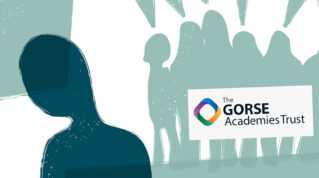Suspended secondary school pupils are about a year behind their peers on average by the time they take their GCSEs, new research has found, putting a number on the “suspension grades gap” for the first time.
However, researchers warned they “cannot be sure” that suspension itself caused the difference in GCSE grades, as there could be other “unmeasured characteristics”.
The Education Policy Institute found suspended pupils were, on average, not achieving a grade 4 pass in GCSE English and maths. Their average grade was 2.78 compared, to 4.72 for their non-suspended classmates.
Researchers, commissioned by the charity Impetus, warned suspended pupils were on average 12 months behind their non-suspended peers.
The EPI said nearly half of the effect of suspensions on attainment appears to be driven by other factors such as demographics, socio-economic disadvantage, prior attainment and school characteristics. But the gap remained “significant and stark”.
The think tank made policy recommendations, including that schools should “proactively” identify pupils at risk of suspension for early intervention.
Ben Gadsby, head of policy and research at Impetus, said: “While it is not a surprise that suspended pupils get worse outcomes, this new research puts a number on the ‘suspension grades gap’ for the first time.
“With only half the reason for these different outcomes being explained by measurable differences between pupils and schools, this is an important finding about the need to focus on the underlying issues that reduce pupil’s chances of succeeding in school.”

The research found pupils suspended 10 times were 15 times more likely to be permanently excluded and finish secondary school in alternative provision than pupils suspended once.
These children were almost three times as likely to be identified with special educational needs and disabilities as pupils who were suspended once. Social, emotional, or mental health needs (SEMH) were the most common among suspended pupils.
Meanwhile, 22 per cent of suspended pupils were identified as persistently absent before their first suspension, the think tank found.
Recent government data showed a 39 per cent increase in suspensions in the 2022-23 autumn term compared to pre-pandemic 2019. Prior to the pandemic, suspension rates had been increasing gradually.
The think tank said schools should plan early intervention for those identified as at risk of suspension.
The Department for Education should work with Ofsted to ensure suspended pupils have access to high quality education, researchers added. They also want more research to understand the recent rise in suspension rates.
Whitney Crenna-Jennings, EPI’s mental health and wellbeing associate director, said it was “vital” schools were given resources to help identify pupils with mental health and additional needs “to make early intervention possible”.
Paul Whiteman, general secretary at school leaders’ union NAHT, said schools only use suspensions and exclusions as a “last resort to ensure the safety of pupils and staff” and called for more investment in support services.
“As this report points out, suspensions themselves do not necessarily cause worse grades – the picture is far more complex than that with suspension rates and lower GCSE grades being driven by a range of complex and common causes.”
A DfE spokesperson said under its reforms, AP schools will provide “targeted support” to mainstream schools which “will increase attendance and allow schools to support pupils who are at risk of exclusion”.
















What we need to understand is that young people who are suspended/excluded are not engaging in education. This may be due to the provision not meeting an un-met need. This may be due to they are over stretched as many of the support systems that support young people. This is not to suggest the provision is inept, nor that underfunding is a major contributor. Cuts to funding and poor CPD plays a a significant part. This is a chicken and egg question and is far more complex than a simple headline/sound bite suggests.
A similar study found that pregnant women are more likely to give birth than virgins.
How about they just follow the simple instructions and the super simple lessons (compared to the past) they are provided with and none of this would be an issue?
Students do not want to attend these Academies due to the relentless high expectations placed on them if they breathe heavily they get sanctioned. Academies need to accept & learn that not every student is the same. Also understand that parents are also experiencing rude & defiant behaviour at home its part of growing up every adult was once a high school kid & none of us were exactly perfect because there is no such thing as perfection everything has it’s flaws & consistent relentless punishment is not the answer but you can all thank Tom Bennett for the many mental health issues these students are developing especially when the main rule in Academies is ‘Children should be seen & not heard’. Academies are not only destroying students personal health & wellbeing they are also making students hate school because their learning style just isn’t fun anymore. Academies are more like a youth offending institute than a school.